Chinese New Year 2018: Dogs, luck and why you should avoid medicine, laundry and crying children

Each Chinese New Year is characterised by one of 12 animals which appear in the Chinese zodiac - and the next one is the Year of the Dog.
The annual celebration begins on the new moon that comes between 21 January and 20 February. This year, it starts on 16 February 2018 and will end on 4 February 2019, when the Year of the Pig begins.
The new year, also known in China as the Spring Festival, is marked by the lunisolar Chinese calendar; this means the date changes from year to year.
The festivities usually start the day before the New Year and continue until the Lantern Festival, the 15th day of the new year.
The Chinese zodiac is divided into 12 blocks (or houses) just like its western counterpart, but with the major difference that each house has a time-length of one year instead of one month.
This year, the Year of the Dog, is the 11th animal in the cycle. Last year was the Year of the Rooster and the next Year of the Dog will be in 2030.
Which Chinese zodiac sign are you?
Your sign is derived from the year you were born in the Chinese lunar calendar.
Rat: 2008, 1996, 1984, 1972, 1960
Ox: 2009, 1997, 1985, 1973, 1961
Tiger: 2010, 1998, 1986, 1974, 1962
Rabbit: 2011, 1999, 1987, 1975, 1963
Dragon: 2012, 2000, 1988, 1976, 1964
Snake: 2013, 2001, 1989, 1977, 1965
Horse: 2014, 2002, 1990, 1978, 1966
Sheep: 2015, 2003, 1991, 1979, 1967
Monkey: 2016, 2004, 1992, 1980, 1968
Rooster: 2017, 2005, 1993, 1981, 1969
Dog: 2018, 2006, 1994, 1982, 1970
Pig: 2019, 2007, 1995, 1983, 1971
The years above are a rough guide; bear in mind that if you were born in January or February it may be slightly different as the new year moves between January 21 and February 20.
The years allocated to each animal are in a very specific order. According to an ancient Chinese folk story, the Jade Emperor had called 13 animals to a meeting and announced that the years on the calendar would be named according to the order they arrived in. This led to 'The Great Race'.
The rat travelled on the back of the ox, leaping from its back to nab first place. The pig stopped for a snack and a nap and arrived last; a cat was also in the race but drowned during the competition, leading to their only being 12 animals in the zodiac.
Why Donald Trump should be on his guard this year
According to Chinese astrology, the year of your sign is believed to be one of the most unlucky years of your life. This doesn't bode well for anyone born in previous Years of the Dog; famous names who should be wary include Donald Trump (born in 1946), Prince William and Kate Middleton (both born in 1982).
Trump's most famous impersonator Alec Baldwin was also born in the Year of the Dog, as well as Bill Clinton, George W. Bush, Madonna, Andie MacDowell, Judi Dench, Liza Minelli, Justin Bieber, Sharon Stone and Susan Sarandon.
Lucky Signs for the Dog
Those born in the Year of the Dog are going to need all the luck they can get. Lucky numbers for people born in the Year of the Dog are 3, 4 and 9 and their lucky colours are green, red, purple. Their lucky flowers are rose, oncidium and cymbidium orchids and their lucky directions are east, southeast and south.

The personality of the Dog
People born in the Year of the Dog are characterised as loyal, sociable, courageous, diligent, steady, lively, adaptable and smart. Not afraid of difficulties in day to day life, they have a harmonious dynamic with people in their lives.
Strengths: Valiant, loyal, responsible, clever, courageous, lively
Weaknesses: Sensitive, conservative, stubborn, emotional
Why do the Chinese value dogs?
Dogs symbolise luck to the Chinese: if a stray dog approaches a house, it is said to show the fortune is coming to the family. The animal is incredibly loyal to its owner, whether or not the owner is wealthy. Plus, dogs bark to warn people if an intruder is nearby; centuries ago, the Chinese would predict good or bad luck according to the amount of times a dog barked.
The animal is seen often in Chinese mythology: Erlang, a popular supernatural stock character, has a dog in the novel Journey to the West. Over the course of the story, Erlang's dog rescues him on several occasions, including by biting his master's adversary Sun Wukong on the leg and attacking a nine-headed insect demon.
A dog is also integral to the legend of Panhu. The Chinese sovereign Di Ku's dog Panhu killed an enemy army general in the tale, helping him win the war. The dog was then rewarded with marriage to the emperor's daughter, whom he carried to the south of the country. Panhu has since been worhipped by the Southern Yao and She minorites - often referred to as King Pan - and is the reason the eating of dog meat is forbidden in their communities.

What does your Chinese zodiac sign mean?
In Chinese astrology, the 12 animal zodiac signs each have unique characteristics.
Rat: Intelligence, adaptability, quick-wit, charm, artistry, greagariousness.
Ox: Loyalty, reliability, thoroughness, strenghth, reasonability, steadiness, determination.
Tiger: Enthusiasm, courage, ambition, leadership, confidence, charisma.
Rabbit: Trustworthyness, empathy, modesyt, diplomacy, sincerity, sociability.
Dragon: Luckiness, flexibility, eccentricity, imagination, artistry, spirituality, charisma.
Snake: Philosophical, organised, intelligent, intuitive, elegant, attentive, decisive.
Horse: Adaptable, loyal, courageous, ambitious, intelligent, adventurous, strong.
Sheep: Tasteful, crafty, warm, elegant, charming, intuitive, sensitive, calm.
Monkey: Quick-witted, charming, lucky, adaptable, bright, versatile, lively, smart.
Rooster: Honest, energetic, intelligent, flamboyant, flexible, diverse, confident.
Dog: Loyal, sociable, courageous, diligent, steady, lively, adaptable, smart.
Pig: Honorable, philanthropic, determined, optimistic, sincere, sociable.
Popular Chinese New Year Greetings
If you want to get into the swing of the festivities but don't have the foggiest how to decipher Mandarin characters, here is our handy guide to the most essential phrases.
1. 新年快乐 / 新年快樂 (xīn nián kuài lè) 'Happy New Year!'
In Mandarin: /sshin-nyen kweye-luh/
In Cantonese: /san nin fai lok/
2. 新年好 / 新年好 (Xīn nián hǎo) 'New Year goodness!'
In Mandarin: /sshin-nyen haoww/
In Cantonese: /sen-nin haow/
3. 恭喜发财 / 恭喜發財 (Gōngxǐ fācái) 'Happiness and prosperity!'
In Mandarin: /gong-sshee faa-tseye/
In Cantonese: Kunghei fatchoy /gong-hey faa-chwhy/
4. 步步高升 / 步步高陞 (Bùbù gāoshēng) A steady rise to high places! — "on the up and up"
In Mandarin: /boo-boo gaoww-shnng /
In Cantonese: /boh-boh goh-sshin /
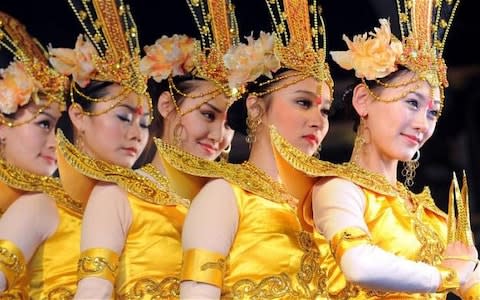
Chinese New Year's Day taboos
There are many superstitions surrounding Chinese New Year. These are to be avoided on the first day of the festival:
Medicine: Taking medicine on the first day of the lunar year means one will get ill for a whole year.
New Year's breakfast: Porridge should not be eaten because it is considered that only poor people have porridge for breakfast - and people don't want to start the year “poor”.
Laundry: People do not wash clothes on the first and second day because these two days are celebrated as the birthday of Shuishen (水神, the Water God).
Washing hair: Hair must not be washed on the first day of the lunar year. In the Chinese language, hair (发) has the same pronunciation and character as 'fa' in facai (发财), which means ’to become wealthy’. Therefore, it is seen as not a good thing to “wash one’s fortune away” at the beginning of the New Year.
Sharp objects: The use of knives and scissors is to be avoided as any accident is thought to lead to inauspicious things and the depletion of wealth.
Going out: A woman may not leave her house otherwise she will be plagued with bad luck for the entire coming year. A married daughter is not allowed to visit the house of her parents as this is believed to bring bad luck to the parents, causing economic hardship for the family.
The broom: If you sweep on this day then your wealth will be swept away too.
Crying children: The cry of a child is believed to bring bad luck to the family so parents do their best to keep children as happy as possible.
Theft: Having your pocket picked is believed to portend your whole wealth in the coming year being stolen.
Debt: Money should not be lent on New Year’s Day and all debts have to be paid by New Year’s Eve. If someone owes you money, do not go to their home to demand it. Anyone who does so will be unlucky all year.
An empty rice jar: A depleted receptacle may cause grave anxiety as the cessation of cooking during the New Year period is considered to be an ill omen.
Damaged clothes: Wearing threadbare garments can cause more bad luck for the year.
Killing things: Blood is considered an ill omen, which will cause misfortunes such as a knife wound or a bloody disaster.
Monochrome fashion: White or black clothes are barred as these two colours are traditionally associated with mourning.
Giving of certain gifts: Clocks, scissors, and pears all have a bad meaning in Chinese culture.
How to celebrate in the UK
The main celebrations in London, which are set to be the biggest outside Asia, will take place on 18 February, the first Sunday after Chinese New Year. The occasion is marked in Chinatown, where a parade traditionally takes place.
It will begin at 10am with a dragon and lion dance on Charing Cross Road. There will be performances from 12pm at Trafalgar Square, with traditional Chinese dance and music expected.
The area surrounding Chinatown will be split into zones. In the Shaftesbury Avenue 'martial arts and culture zone' there will be martial arts performances and traditional flag display, while in Leicester Square the 'family zone' will see calligraphy and the chance to dress up in traditional Chinese clothing.
There will be two 'food zones': in Trafalgar Square, where you buy a meal from a street stall, and in Chinatown. There will also be a 'community zone' on Charing Cross Road, where visitors can watch performances from British-Chinese artists.
In Manchester, there will be martial arts and dance displays in Albert Square from midday, with the main parade setting off from Albert Square to Chinatown at 1pm. From 2pm there will be acrobatics, music and dancing in both Albert Square and Chinatown, with fireworks at 6pm from Chinatown.
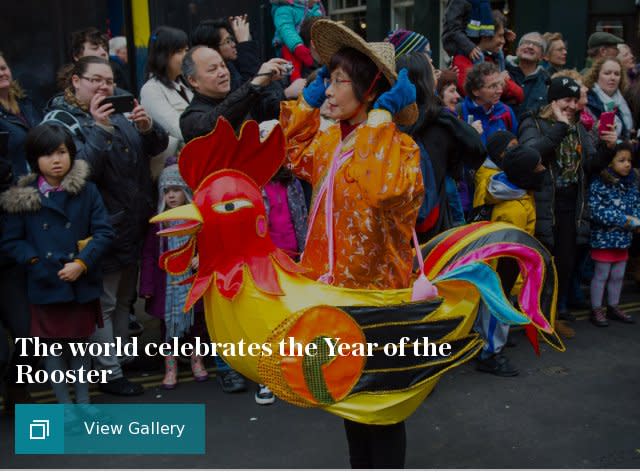
Where to eat in London
From Hunanese dishes to Cantonese classics, Lizzie Mabbot reveals her favourite spots in the capital city.

...or what to cook at home
Diana Henry: The essential spices and sauces to upgrade your Chinese cooking
From which vinegar to use to the ideal noodles and fried parcel wrappers, Kei Lum Chan and Diora Fong Chan advise Diana on which products create the most authentic tastes and textures.
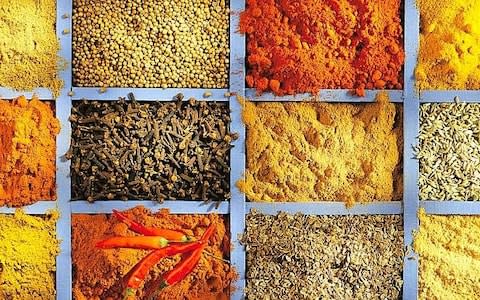
Shanghai stir-fried chunky noodles
This Shanghainese dish is made with thick, bouncy noodles like fresh Japanese udon, which are given a dark caramel tint by soy sauce and freshened up with barely cooked greens.

Cool steamed aubergine with a garlicky dressing
Steaming brings out a gentle, unfamiliar side to a vegetable that is more commonly fried, baked or grilled, and, simple as they are, the seasonings taste sublime.

How to make a traditional Jiaozi dumpling
Chef Jason Li as he demonstrates how to make make a traditional Jiaozi dumpling, which is eaten with friends and family at Chinese New Year.
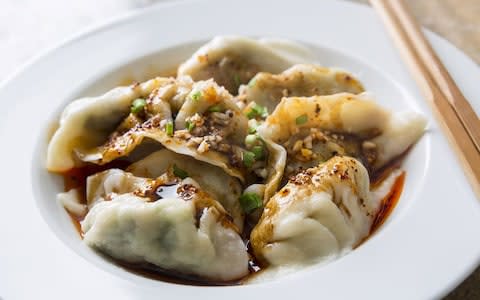
Ken Hom reveals his trick for quick and tasty fried rice.
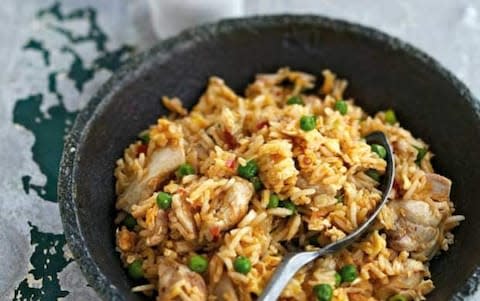

 Yahoo News
Yahoo News 
